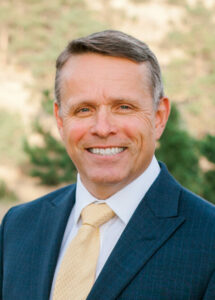Last Updated on November 14, 2022 by OCF Communications

Community has been at the core of Officers’ Christian Fellowship since our initial foundation in 1943. The Oxford Dictionary defines community as “a feeling of fellowship with others, as a result of sharing common attitudes, interests and goals.”
Our need for community is as strong now as ever in our history. One of the clearest Biblical outlines for true community can be found in 1 Peter 4:7-11:
“The end of all things is at hand; therefore, be self-controlled and sober-minded for the sake of your prayers. Above all, keep loving one another earnestly, since love covers a multitude of sins. Show hospitality to one another without grumbling. As each has received a gift, use it to serve one another, as good stewards of God’s varied grace: whoever speaks, as one who speaks oracles of God; whoever serves, as one who serves by the strength that God supplies—in order that in everything God may be glorified through Jesus Christ. To him belong glory and dominion forever and ever. Amen.”
If we genuinely take to heart what the Lord commands us in this passage, we will find that OCF still has so much to offer one another, the military community, and our world wherever He has providentially placed us to live, work and serve.
It begins with the reminder that our Lord and Savior is truly going to return to this earth and that we should be living with the realization that His return could be any day (v7). In light of this fact, we need to be self-controlled and clear-minded so that we can pray as we should (v7). I for one am too easily distracted by all around me, even the “good” things, to remain in a constant attitude of prayer as He commands us (1 Thessalonians 5:16-18).
Above all, we need to keep on loving one another earnestly, recognizing that love covers a multitude of sins (v8). Rather than grumbling and finding fault with one another, we need to love each other deeply the way Christ demonstrated love to us, not waiting until we are loveable, but loving us while we were yet sinners (Romans 5:8). We need to be honest about our own brokenness and willing to embrace others in the midst of theirs.
We need to show hospitality to one another, and we are reminded to do so without grumbling (v9). Like community, hospitality is at the heart of OCF.
We need to recognize that as a believer, God has given each of us gifts (v10). It doesn’t matter your position or title, whether you feel gifted, or even whether you think you deserve a gift. It is, after all, a gift. But the purpose of this gift is not to elevate or promote ourselves. It is not even for us at all, but rather to serve others and to be a steward of His grace. If God has freely given us His grace, which He has, are we being a good steward of sharing His grace with others as He commands us? He doesn’t give us the option of only extending His grace to those we like or agree with on every issue. We need to extend His grace freely to others for the purpose of reconciling them to Him (2 Corinthians 5:18-20).
When we are speaking, do we consider what and how God would have us speak to a person, or do we merely voice the first thing that comes to our mind (v11)? Even Jesus said He did not speak on His own, but only what the Father has given Him to say (John 12:49). How much more do we need to be “quick to hear, slow to speak and slow to anger” (James 1:19)?
While you may not think you have the gift of serving, Jesus has called us all to serve (John 13:14-17). In the military community, it is quite common to hear about servant leadership, even within secular environments. But servant leadership has intense implications. Warren Wiersbe says you will know you have a servant’s heart when you don’t mind being treated like one. I don’t know about you, but I don’t always like being treated like a servant, yet that is part of our calling. We can only be successful in this calling if we remember that we can only accomplish it through His strength (v10).
Finally, we need to remember that in addition to the gift not being for ourselves, but others; the reason we serve others is ultimately not just for them, but so that “in everything God may be glorified through Jesus Christ” (v11). This is important because even if we get everything above “right,” if we serve only for others, then when we do not see the response we desire, we might be tempted to lose heart, or pull back from community. But if we remember we serve and sacrifice because He did, and He calls us to do likewise so that He may be glorified, then we can awake each morning eager to get about His business of deeply loving the community where He has placed us.
In the process, the military community, and the world, will be impacted by Christ-like leaders for His glory!








Leave A Comment